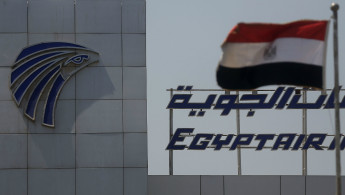Search on for clues in EgyptAir crash
President Abdel Fattah al-Sisi said it was too early to tell what caused the Airbus A320 to plunge into the sea with 66 people on board last Thursday.
Some wreckage from the plane that had been en route to Cairo from Paris has been found, but none of the passengers' bodies, a civil aviation ministry spokesman said on Sunday.
France's aviation safety agency said Flight MS804 had transmitted automated messages indicating smoke in the cabin and a fault in the Flight Control Unit.
Sisi said a submersible that can operate 3,000 metres (9,800) below sea level had been enlisted from the oil ministry, and urged against speculation on why the plane went down.
"All the theories are possible," he said in a televised address. "There is no particular theory we can affirm right now."
Egypt's aviation minister has said terrorism is more likely than technical failure, without offering any evidence.
French Foreign Minister Jean-Marc Ayrault said "all theories are being examined and none is favoured".
|
Final communication with EgyptAir Flight 804 - The first available audio from the doomed flight indicates that all was routine as the pilot checked in with air traffic controllers in Zurich, Switzerland, around midnight, before being handed over to Italian air traffic controllers in Padua [Padova]. |
A French navy spokesman said a French maritime surveillance plane "on Sunday detected a lot of floating objects, probably related to the aircraft, in the search area".
The disaster follows the bombing of a Russian airliner over Egypt's Sinai Peninsula last October that killed all 224 people on board.
The Islamic State group claimed responsibility for that attack within hours, but there has been no claim linked to the EgyptAir crash.
A rare audio message on Saturday by the group's spokesman Mohamed al-Adnani made no mention of the plane, although it called for attacks on the US and European countries, especially civilians, during the Muslim fasting month of Ramadan which begins in June.
The message may have been recorded before the EgyptAir disaster.
A French patrol boat carrying equipment capable of tracing the black boxes was expected in the search area between the Greek island of Karpathos and the Egyptian coast on Monday afternoon.
Black box signals
Experts have warned that the equipment could be useless if the black boxes - which can emit signals for up to five weeks - have sunk to a depth of more than 2,000 metres (6,500 feet).
French and Egyptian aviation officials have said it is too soon determine what brought down the plane.
It is "far too soon to interpret and understand the cause of the accident as long as we have not found the wreckage or the flight data recorders", a spokesman for France's Bureau of Investigations and Analysis (BEA) said.
An Egyptian aviation ministry statement cautioned against drawing conclusions based on a "single source of information such as the ACARS messages which are signals and indicators that may have different causes".
ACARS - Aircraft Communications Addressing and Reporting System - transmits short messages between aircraft and ground stations.
The ACARS messages read "smoke lavatory smoke" then "avionics smoke" - referring to the plane's electronic systems - then a "fault" with the FCU, the flight control unit, and another control unit, a BEA official told AFP.
The plane had turned sharply twice before plunging 6,700 metres (22,000 feet) and vanishing from radar screens early Thursday, Greek Defence Minister Panos Kammenos said.
The passengers were 30 Egyptians, 15 French citizens, two Iraqis, two Canadians, and citizens from Algeria, Belgium, Britain, Chad, Portugal, Saudi Arabia and Sudan. They included a boy and two babies.
Seven crew and three security personnel were also on board.
EgyptAir Holding Company chairman Safwat Moslem told AFP the priority was finding the passengers' remains and the flight recorders, which will stop emitting a signal when the batteries are exhausted.
The airline said on Sunday it was working with the government to issue death certificates for the victims.
On Saturday, a funeral service was held at a Cairo church for 26-year-old EgyptAir hostess Yara Hany Farag.
In a hall decorated with flowers, a picture of a smiling Yara was placed on a cross covered entirely with white flowers.
The young woman was engaged to be married.





![Israeli forces ordered bombed Gaza's Jabalia, ordering residents to leave [Getty]](/sites/default/files/styles/image_330x185/public/2176418030.jpeg?h=a5f2f23a&itok=_YGZaP1z)

